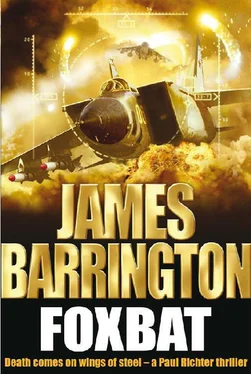He next picked up the AK47s and slung them over his shoulder – the team being armed only with pistols, the Kalashnikovs might prove useful once they’d left Dobric. After searching the corpses for spare magazines and ammunition, he headed back to the warehouse.
Ninety minutes later, they’d loaded all three trucks with a total of forty-eight of the long, heavy boxes, sixteen to each vehicle. Draco checked their loads carefully to ensure that the weight was evenly distributed and properly lashed down. Finally he gave the order to drive off, but only after they had dragged the dead men out of the warehouse and dumped them out on the roadway near their two companions. That way, there’d be no immediate pointer to the munitions they’d stolen, though the theft was bound to be discovered within days or even hours.
The trucks stopped just outside the main entrance while the seventh member of the group locked the gates behind them. Then he carefully returned both sets of keys to the safe and climbed back over the gates to rejoin his companions. Before they moved off, they all discarded the Air Force uniforms they’d been wearing and replaced them with blue workmen’s overalls.
Draco waved briefly from the cab of the leading truck, whereupon they turned out onto the road and headed south. Varna was only a short drive, about thirty-five miles, and Draco knew a cargo ship with Panamanian registry was waiting there for their precious load. Once they’d delivered it, this group of men would disperse, and probably never see each other again. They’d been recruited individually from the Bulgarian underworld for this single operation, for which they had all been very well paid. None had any idea what was contained in the boxes or of their importance to their recruiter, a middle-aged man of Chinese appearance who spoke their language only haltingly.
As the trucks bounced and rattled on down the road, only the drivers themselves were visible in the cabs. In the back of each vehicle the other men were completing their penultimate task by carefully pasting pre-prepared shipping labels over the stencilled ‘R-40T’ markings.
Rossyia Hotel, Moscow
The Rossyia is vast: twelve floors containing three thousand two hundred rooms; nine restaurants, two of which can each accommodate a thousand diners; six bars; fifteen snack bars, and the world’s biggest ballroom. It also possesses a huge cinema, the Zaryadye, that can hold three thousand people. Publicity material relating to the hotel dubs it ‘The Palace’ but, as the black Mercedes approached the vast structure squatting beside the Moskva river, Richter could see why it had attracted that other, less complimentary, epithet, ‘The Box’.
Bykov had booked him a room on the sixth floor, and the GRU officer suggested they adjourn to a bar, once Richter had deposited his bag there.
‘We checked the room thoroughly for bugs yesterday,’ he explained, ‘but in Moscow you never really know who’s listening to you. That’s why I’d feel more comfortable in the bar. I regret to say that your presence here has not been met with universal approval, and I’ve been instructed that you should not to be allowed to visit my office or any other building used by the GRU or SVR.’
‘Hotels and bars are fine with me,’ Richter assured him.
They found a booth at the back, ordered drinks and waited till they were placed on the table in front of them.
‘Right, Viktor, I’m all ears.’
Despite his fairly fluent English, for a moment Bykov looked confused – he hadn’t heard that expression before – but then his face cleared. ‘Very well. Let me start at the beginning. Since the break-up of the Soviet Union our armed forces have remained in a state of flux. For a long time it wasn’t always clear exactly what weapons or aircraft were located at what bases, nor who had control of those assets. Salaries weren’t being paid, officers and men weren’t getting relieved at the ends of their tours of duty, all that kind of thing. It was a total mess, an administrative nightmare.’
Richter nodded. ‘The West was very concerned about what was going on. But now you seem to have got everything sorted out, yes?’
‘Yes, we have – or most of it, anyway. But as Moscow re-established positive control of all branches of the armed forces, and as a matter of routine began comparing listed inventories with the assets that could actually be located and identified, some accounting discrepancies were discovered.’
‘“Accounting discrepancies”?’
‘That’s what Moscow called them, yes. At some of the more remote, less well-supervised military bases, it became apparent that some officers had been supplementing their salaries by disposing of certain equipment they decided was surplus to requirements. Basically, they would write off a few cases of AK47s, say, on the grounds that they had been damaged by immersion in water, and then sell them to anyone who wanted them. Once this came to light, Moscow finally understood why the Chechen rebels seemed so well-armed – they’d obtained most of their weapons and ammunition direct from Russian regular forces.’
‘You didn’t bring me all the way out here to talk about a few black-market Kalashnikovs, Viktor. What else went missing?’
A look of embarrassment flitted across Bykov’s face. ‘You’re quite right. Missing small arms are a matter of concern, obviously, but we soon discovered that some larger and more expensive pieces of military equipment also couldn’t be accounted for. In particular, we seemed to be missing a few aircraft.’
‘What aircraft, precisely?’
‘The Russian Air Force reported that it couldn’t locate fourteen of its Mikoyan-Gurevich MiG-25 interceptors: the aircraft NATO has codenamed the Foxbat.’
Richter stared at him. ‘Jesus, Viktor, you can’t misplace something that size, and certainly not fourteen of them.’
‘I agree. Yesterday,’ Bykov added, looking even more unhappy, ‘that number went up to sixteen. An inspection team sent to the Letneozerskiy interceptor base – you might know it as Obozerskiy Southeast – in Karelia, near the Finnish border, couldn’t account for two MiG-25s that were supposed to be on the strength of 524 IAP. What’s even more disturbing is that all the members of the inspection team were killed outright when their aircraft crashed shortly after leaving the same base. An initial inspection of the wreckage suggests that it exploded in midair. We only know about the missing MiGs because the team leader telephoned Moscow two days earlier to explain that he’d have to go in person and check if they were currently at a maintenance facility in the Ukraine before he rendered his final report. I’ve since checked with Zaporizhia, the facility in question, and the MiGs definitely aren’t there.’
For a few moments Richter was silent, then he spoke slowly. ‘I can see your problem, Viktor. What I’m not sure about is how you think I can help you solve it.’
Bykov raised a hand to the waiter and requested another round.
‘As you well know, we have adequate technical intelligence resources – satellites, phased-array radars and the like. Our problem is that our satellites carry out surveillance only of countries we consider to be hostile or potentially hostile to Russia. Likewise, our radars look outwards, across our borders, into China, Scandinavia and all the other countries that surround us. What we don’t have is much satellite coverage of activity here inside Russia, and before we can work our where the MiG-25s have gone, we need to get access to the take from whatever satellites the Americans had within range when those aircraft went missing. So I supplied whatever dates and locations I could deduce to your section, and requested that you brought the images with you.’
Читать дальше












